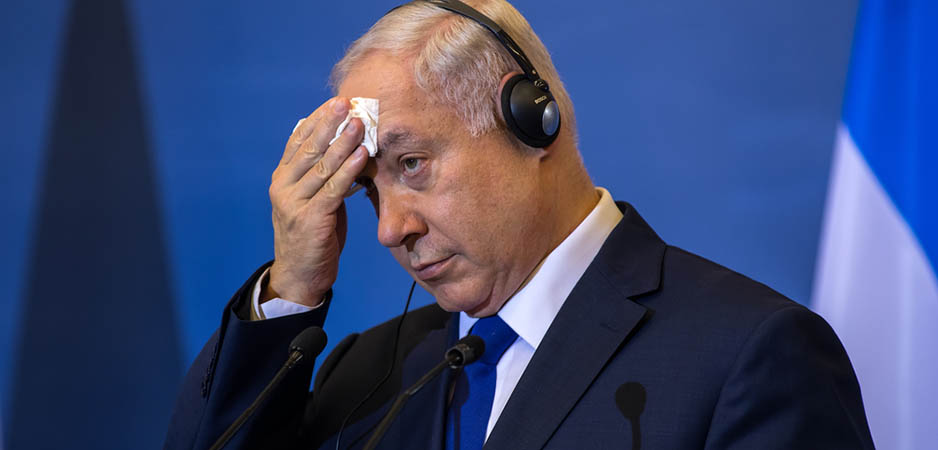Before the courts decide whether Benjamin Netanyahu will have to do time for corruption and fraud, the Israeli president has mercifully given him “more time” to build a coalition for a new government.
Following the very close outcome of Israel’s recent election that gave no party a majority, Reuters reported on May 11 that “Prime Minister Benjamin Netanyahu will ask Israel’s president for more time to form a new government.” Two days later, The Times of Israel said the prime minister was “given an extra 14 days to cobble together a coalition after asking for an extension, citing Passover and recent Gaza fighting.”
That was a polite way to avoid mentioning Netanyahu’s slight problem of awaiting indictment for corruption at the time of his election.
Here is today’s 3D definition:
More time:
The basic requirement felt by every government of every democracy to make every important decision in the historical period that began in 2016
Contextual note
Politics in Israel may seem more disjointed than ever, and the tiny nation in the Middle East is obviously a political entity like no other, whose effect on the region and global geopolitics is wildly disproportionate to its size. Buying “more time” for a solution that, for various reasons, is likely to prove untenable seems to be the flavor of the year. We’ve witnessed this in Theresa May’s Britain, Juan Guaidó’s version of the Venezuelan revolution and even in Robert Mueller’s supposedly game-changing report on the 2016 US election, which was finally delivered after so many delays but whose mystery remains.
At a moment of history in which wars never end, internal conflicts, misunderstandings, cultural breakdowns and the implosion of traditional political parties have become the new ever ongoing norm. The one thing we never see is a resolution, an outcome, a palpable transition or even a restoration of a pax ante bellum. Without forgetting that the two Koreas are officially still at war nearly 70 years on, and last year’s diplomatic initiative to announce its end is still waiting to be implemented.
Although no party has ever had a majority in Israel’s Knesset, this time round things are far more complicated than usual for Netanyahu. Accused of corruption — the legal consequences of which he may be able to wiggle out of if he puts his “more time” to good use in choosing his allies — Netanyahu has been anointed “king of Israel.” Though, as American Jews have been quick to point out, he’s not “king of the Jews,” which may mark a significant change in Israel’s all important political relationship with the US, especially if President Donald Trump fails in his 2020 re-election bid.
The Times of Israel reminds us that under “Israel’s semi-constitutional Basic Laws, an election winner has 28 days to form a government but the president can grant an extension of up to 14 days.” Even with the extension, it isn’t clear how Netanyahu will build his ruling coalition. He has little choice but to appeal to the extreme ultra-orthodox right, which means his administration is likely to be both unstable and unpopular.
Netanyahu was re-elected despite the fact that he is awaiting trial on such insignificant charges as “bribery, fraud and breach of trust.” Israelis and the prime minister himself may be reassured by the fact that “Netanyahu is not required to resign if indicted, only if convicted with all appeals exhausted.” That should buy him some more time, but also cast a shadow on his political status and the nature of his mandate.
Historical note
All of this is taking place as the world awaits the unveiling of Jared Kushner’s famous Middle East peace plan, now forecast for June. In what may be the understatement of the decade, Reuters announces that “prospects for the peace plan appear dim.” Even Kushner seems to be assailed by existential doubt. In its own quest for more time, the Trump administration has been serially postponing the “imminent” release of the “deal of the century” for nearly a year, while carefully concealing the exact formulation of terms that every observer and the authors themselves believe will be rejected, if not laughed at as soon as they are made public.
The “more time” that the administration has been consistently granting itself has become a comic leitmotif. Every marketing genius knows that the longer you maintain suspense, the greater the expectations become. And the harder the fall will be when the mountain gives birth to a mouse, to borrow a trope made famous by Roman poet Horace, who nevertheless elsewhere counseled patience when no immediate solution appears in the offing (sed levius fit patientia).
Who hasn’t marveled at British Prime Minister Theresa May’s patience, which is still going strong more than six weeks after missing her absolute deadline to get Brexit sorted by March 29? She should be crowned the all-time champion of scratching out “more time” for no other purpose than postponing any meaningful decision. A perfect strategy, it would seem — at least theoretically — for avoiding accountability. History may be less forgiving.
And what about French President Emmanuel Macron, who has a protected majority in the National Assembly for three more years and, therefore, has time on his hands? He is nevertheless dogged by the yellow-vest protesters, who despite waning numbers are unlikely to disappear and have effectively poisoned his well. Their mysterious presence spread across the land, with or without numbers for the weekly Saturday demonstrations, has made it impossible for Macron to impose his Jupiterian will in his initial plan to achieve the apotheosis of his presidency as the ultimate avatar of the already supremely presidential Fifth Republic. Unlike Netanyahu, he has no need to ask for more time, but he knows that, if he did, he wouldn’t get it, which may be even more disheartening.
And finally there’s President Trump, who just last week took seriously Liberty University President Jerry Falwell’s suggestion in a tweet that “Trump should have 2 yrs added to his 1st term as pay back for time stolen by this corrupt failed coup,” a reference to the “Russiagate” investigation. Democrats worry that the current denizen of the White House “may decide to contest the legitimacy of the election in 2020 if he is defeated or otherwise argue for an extended time in office.”
With Trump, nothing is impossible, but what this and the other cases mentioned above reveal is that politicians and democracies themselves appear to be increasingly helpless, if not inept in dealing with the question of time. As the world witnesses the decline of the West and the rise of China, this theme may be worth meditating on.
*[In the age of Oscar Wilde and Mark Twain, another American wit, the journalist Ambrose Bierce, produced a series of satirical definitions of commonly used terms, throwing light on their hidden meanings in real discourse. Bierce eventually collected and published them as a book, The Devil’s Dictionary, in 1911. We have shamelessly appropriated his title in the interest of continuing his wholesome pedagogical effort to enlighten generations of readers of the news.]
The views expressed in this article are the author’s own and do not necessarily reflect Fair Observer’s editorial policy.
Support Fair Observer
We rely on your support for our independence, diversity and quality.
For more than 10 years, Fair Observer has been free, fair and independent. No billionaire owns us, no advertisers control us. We are a reader-supported nonprofit. Unlike many other publications, we keep our content free for readers regardless of where they live or whether they can afford to pay. We have no paywalls and no ads.
In the post-truth era of fake news, echo chambers and filter bubbles, we publish a plurality of perspectives from around the world. Anyone can publish with us, but everyone goes through a rigorous editorial process. So, you get fact-checked, well-reasoned content instead of noise.
We publish 2,500+ voices from 90+ countries. We also conduct education and training programs
on subjects ranging from digital media and journalism to writing and critical thinking. This
doesn’t come cheap. Servers, editors, trainers and web developers cost
money.
Please consider supporting us on a regular basis as a recurring donor or a
sustaining member.
Will you support FO’s journalism?
We rely on your support for our independence, diversity and quality.







